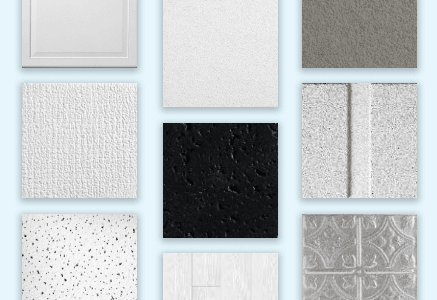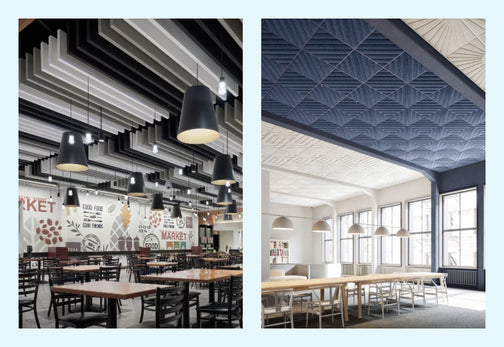Moisture Resistant Ceiling Tiles
Moisture Resistant Ceiling Tiles
- White
- Black
- Boxwood
- Feldspar
- Fossil
- Grey Stone
- Light Grey
- Lilac
- Mist
- Oat
- Rainstorm
- Sandstone
- Stone
- +7
Moisture Resistant Ceiling Tiles
Superior moisture resistant ceiling tiles from Kanopi by Armstrong Ceilings will enhance any space in your business or home and combat ceiling sagging caused by humidity. Gone are the days of saggy, old ceilings, when you choose moisture resistant ceiling tiles.
Mold and mildew can appear in areas of your business or home wherever moisture is present, and ventilation is limited. Some spaces susceptible to this are basements and bathrooms in any home, healthcare facilities, commercial kitchens, clean rooms, and restaurants. Specially-treated moisture resistant ceilings not only stop the spread of mold and mildew, but can also inhibit the growth of mold, odor, and stain-causing bacteria on the treated surface.
In areas of high humidity, it's important to choose a moisture resistant ceiling tile that will remain flat. Some ceilings are safe to use in non-climate-controlled or high humidity spaces, which means they will stand up to common humid conditions.
Shop moisture resistant ceiling tiles at Kanopi today.
Do ceiling tiles absorb moisture?
Ceilings that are marked as moisture resistant can withstand normal levels of moisture within different spaces. They not only stop the spread of mold and mildew, but can also inhibit the growth of mold, odor, and stain-causing bacteria on the treated surface.
What is the best material to use for a bathroom ceiling?
Drywall, acrylic, tile, cement board, and fiberglass are great materials to consider for a bathroom ceiling.
Can you use ceiling tiles in a bathroom?
Ceiling tiles can be used within spaces with low to normal levels of moisture. If you are using ceiling tiles within a bathroom, it's important to use tiles that are moisture resistant.
Can wet ceiling tiles cause mold?
Yes. If the ceiling tiles are not moisture resistant, mold and mildew can grow if they are exposed to high levels of moisture.





























 Thanks for subscribing!
Thanks for subscribing!

